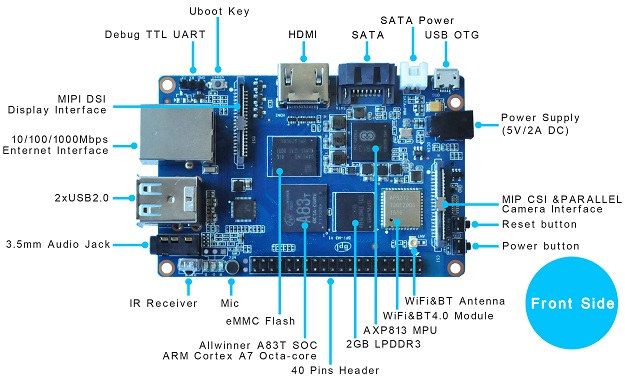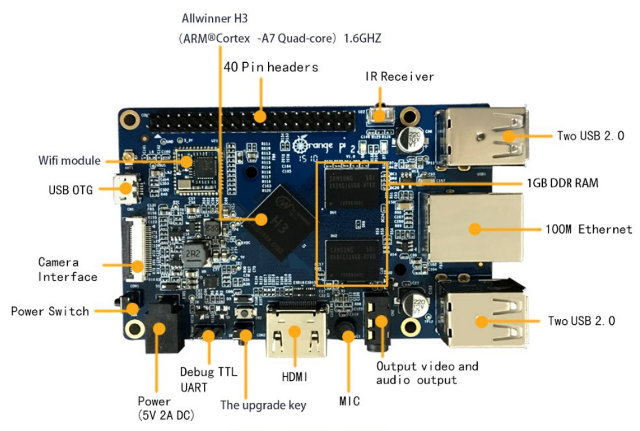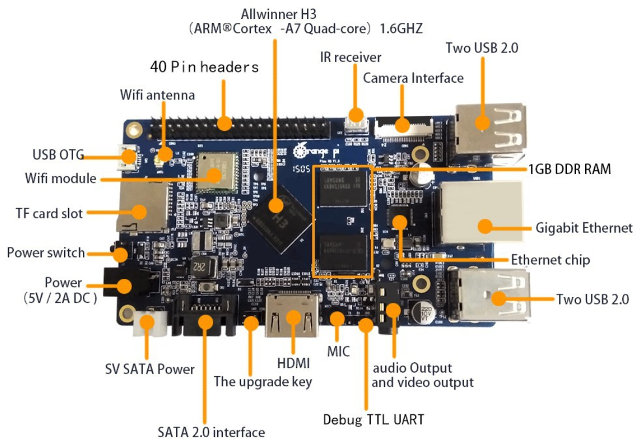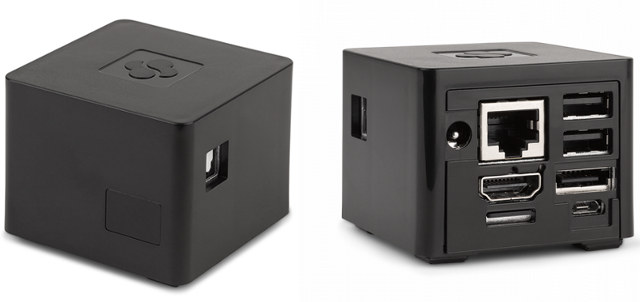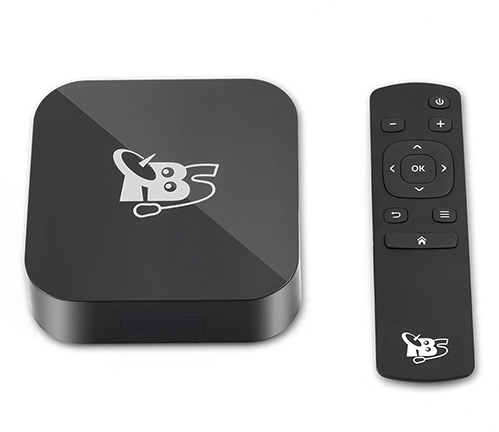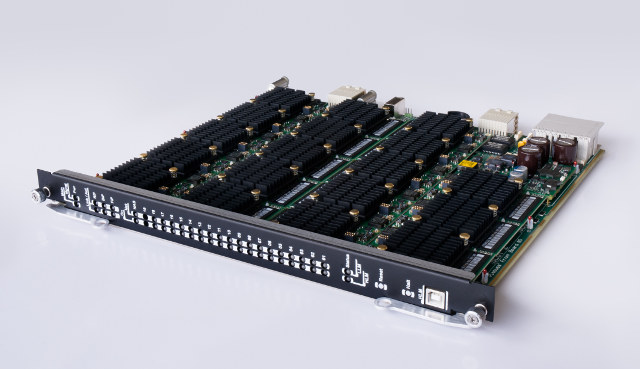Banana Pi developers, in this case SinoVoIP, and not LeMaker, are about to launch a new board: BPI-M3 powered by Allwinner A83T octa core Cortex A7 processor with 2GB RAM and 8GB eMMC. Banana Pi M3 board specifications: SoC – Allwinner A83T octa-core ARM Cortex-A7 @ 2.0 GHz with PowerVR SGX544MP GPU supporting OpenGL ES 2.0/1.1, OpenCL 1.1, DX 9.3. System Memory – 2 GB LPDDR3 Storage – 8 GB eMMC + SATA (via Genesys GL830 USB bridge, shared with 2 USB ports) + micro SD slot Display Interfaces / Video Output – HDMI 1.4 up to 1920×1200, MIPI DSI connector Audio – 3.5mm headphone jack, microphone, HDMI audio Camera I/F – MIPI CSI and Parallel camera interfaces Connectivity – Gigabit Ethernet (Realtek RTL8211E/D), 802.11 b/g/n Wi-Fi and Bluetooth 4.0 (AP 6212 module) USB – 2x USB 2.0 host port, 1x micro USB OTG Debugging – UART for console Headers […]
Allwinner H3 Based Orange Pi 2 Board Price Drops to as Low As $25
As Raspberry Pi Model B+ price got reduced to $25, some competitors also decided to bring their price down. Shenzhen Xunlong Software, the maker of Orange Pi board, decided to decrease their Orange Pi 2 and Orange Pi 2 Mini boards by $5 to respectively $30 and $25 plus around $2 shipping. Both boards are based on the same PCB, but the mini version lacks WiFi. Let’s refresh our memory with the specs: SoC – Allwinner H3 quad core Cortex A7 @ 1.6 GHz with 256KB L1 cache, 1MB L2 cache, and an ARM Mali-400MP2 GPU up to 600 MHz System Memory – 1GB DDR3 Storage – micro SD card slot (up to 64GB) Video Output – HDMI (CEC and HDCP support), AV port Audio I/O – HDMI, AV port, on-board microphone Connectivity – 10/100M Ethernet, 802.11 b/g/n Wi-Fi (Realtek module, not found on mini version) USB – 4x USB […]
Orange Pi Plus (Allwinner H3) Firmware Images and Linux SDK Released
Orange Pi Plus is a development board based on the new Allwinner H3 quad core Cortex A7 processor that supports 4K video output and decoding. The boards comes with 1GB RAM, 8GB eMMC, HDMI output, Gigabit Ethernet, Wi-Fi, SATA and more, and sells for $49 on Aliexpress. When I first covered the board in February, it was already listed on Aliexpress, but I could not find any firmware image, or source code, but this has now changed. There are now four firmware files: Lubuntu_1404_For_OrangePiplus_v0_8_0_.img.xz – Lubuntu 14.04 image Raspbian_For_OrangePiplus_v0_8_0.img.xz – Raspbian for Allwinner H3 orangepi-plus-debian-server-card-v0.9.img.xz – A Debian server image sun8iw7p1_android_orangepi-plus_uart0.rar – Android 4.4.2 image that needs to be flash with PhoenixCard in Windows (Linux tools are not working yet) Beside the firmware images, the company also releases a Linux SDK (h3-lichee-1.0.tar.gz) with Linux 3.4 kernel source code, u-boot, and relevant tools. I assume these should also work on Orange […]
Linaro 15.04 Release with Linux 4.0 and Android 5.1
Linaro 15.04 has been released with Linux 4.0 (baseline), Linux 3.10.74 and 3.14.39 (LSK), and Android 5.1.1. Other noticeable changes include support for the new DragonBoard 410c 96boards compliant board, the addition of A80 Optimusboard (Allwinner A80) to Android Kitkat build, Hisilicon D01 support added to the Debian installer, and support for Ubuntu ARM64 Gnome rootfs. Highlights of the release: Linux Linaro 4.0-2015.04 updated linaro-android topic: aosp/android-3.18 branch has been merged GATOR topic: version 5.20.1 updated integration-linaro-vexpress64 topic by ARM LT (FVP Base and Foundation models, and Juno support) updated topic from Qualcomm LT (IFC6410 and DB410c boards support): Resource Power Manager (RPM) – MSM Shared Memory Driver (SMD) driver quite some changes under drivers/gpu/drm/ related to adv7511 and adv7533 support ASoC support for QCOM platforms external Connector Class (extcon) support (used for USB VBUS and ID detection) Linaro builds of AOSP 15.04 baseline updated to android-5.1.1_r1 updated Nexus 10 […]
$170 Solidrun Cubox-i 4×4 Freescale i.MX6 Mini PC Boasts 4GB RAM, an eSATA Port
Most ARM based mini PCs come with 1 or 2GB RAM, with few exceptions like Nagrace HPH NT-V6 or Tronsmart Draco AW80 Telos featuring 4GB RAM, but they are mostly optimized for Android, and although they can also run Linux desktop distributions there are often caveats with lack of hardware video decoding for example. Solidrun has now added a new model to its Cubox-I mini PC family with Cubox-I 4×4 powered by Freescale i.MX6 quad core processor coupled with 4GB RAM, and it’s also one of the few mini PCs coming with an eSATA port. SolidRun CuBox-i 4×4 specifications SoC – Freescale i.MX6 Quad 4x Cortex A9 @1GHz-1.2GHz with Vivante GC2000 (OpenGL/ES 2.0) System Memory – 4GB 64-bit DDR3 @ 1066 MHz Storage – microSD card slot, eSATA II (3 Gbps) connector Video Output – HDMI 1.4 with 3D support Audio Output – HDMi, optical S/PDIF Connectivity – Gigabit Ethernet […]
TBS 2980 Matrix 2 AllWinner A80 Android TV Box Will Support USB Tuners
TBS launched their Matrix 2910 media player based on Freescale i.MX6 Quad processor in 2013, and what made the platform especially interesting was support for the company’s USB DVB tuners in their Android and Ubuntu images. The company has now unveiled its successor with TBS 2980 Matrix 2 powered by Allwinner A80 octa core processor that will also support USB DVB-T2, DVB-C & DVB-S2 tuners. TBS Matrix 2 specifications: SoC – AllWinner A80 4x Cortex 15, 4x Cortex A7 big.LITTLE processor with PowerVR GC6230 GPU System Memory – 2GB DDR3 Storage – 8GB eMMC + micro SD card slot Video Output – HDMI + AV port Audio – HDMI, AV, and optical S/PDIF Connectivity – Gigabit Ethernet, dual band Wi-Fi 802.11 a/b/g/n, Bluetooth 4.0 USB – 1x USB 3.0 port, 2x USB 2.0 host ports Misc – IR receiver, reset button Power Supply – 5V/3A Dimensions – 101 x 101 […]
Scaleway Provides Dedicated ARM Servers for 10 Euros per Month, 0.02 Euro per Hour
Earlier this year, Online Labs launched a beta hosting program using custom-designed C1 dedicated servers powered by Marvell Armada 370/XP quad core processor. The company has now launched a commercial service called Scaleway providing hosting service on these baremetal servers for 9.99 Euros per month, or 0.02 Euro per hour, as well as a “Infinite Storage” service with 1GB data for 0.02 Euros per month. Here are the details of the 10 Euros plan: Server based on Marvell Armada 370/XP quad core ARMv7 processor Memory – 2GB Memory Storage – 50GB SSD Disk 1x Reserved public IPv4 200Mbit/s – Unmetered bandwith Operating Systems – Ubuntu, Debian, Fedora, ArchLinux ARM. Docker supported. That’s not a VPS, but a dedicated server. For reference, I currently pay around $20 per month (Linode) for a server with an Intel Xeon E5-2680 dual core processor with 2 GB RAM and 50 GB SSD storage, and 3 […]
Linaro 15.03 Release with Linux 4.0 and Android 5.1
Linaro has just announced their 15.03 release with Linux 4.0-rc4 (baseline), Linux 3.10.72 and 3.14.36 (LSK), and Android 5.1. The organization has worked on hardware platforms from members namely Qualcomm, ARM, HiSilicon, Samsung, and STMicro, including the recently announced 96Boards boards, and other ARMv8 platforms. Highlights of the release: Linux Linaro 4.0-rc4-2015.03 updated linaro-android topic added a few build/boot fixes for Arndale (llct-misc-fixes topic) GATOR topic: version 5.20.1 updated integration-linaro-vexpress64 topic by ARM LT (FVP Base and Foundation models, and Juno support) updated topic from Qualcomm LT (ifc6410 board support) simple EEPROM framework (via Qualcomm LT’s topic) updated topic from HiSilicon LT (Hi36xx, HiP04, and X5HD2 families support) rebased “ILP32 patch set v3” onto 4.0-rc2 Linaro builds of AOSP 15.03 updated all the baselines to AOSP 5.1 added commit based trigger feature to CI builds Linaro OpenEmbedded 2015.03 integrated Linaro GCC 4.9-2015.03 dismantled meta-aarch64 layer created meta-ilp32 layer cleaned out […]


